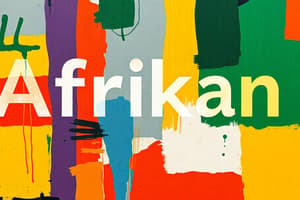Podcast
Questions and Answers
Afrikaans evolved from 17th-century English.
Afrikaans evolved from 17th-century English.
False (B)
Afrikaans is recognized as a minority language in Namibia.
Afrikaans is recognized as a minority language in Namibia.
True (A)
Afrikaans has distinct phonetic characteristics, including specific sounds.
Afrikaans has distinct phonetic characteristics, including specific sounds.
True (A)
The grammar of Afrikaans is more complex than that of Dutch.
The grammar of Afrikaans is more complex than that of Dutch.
There are no notable dialects of Afrikaans.
There are no notable dialects of Afrikaans.
Flashcards are hidden until you start studying
Study Notes
Overview
- Afrikaans is a West Germanic language.
- Primarily spoken in South Africa and Namibia.
- Evolved from 17th-century Dutch.
History
- Originated from the Dutch settlers in the Cape Colony.
- Influenced by various languages: Malay, Portuguese, indigenous African languages, and English.
- Became distinct as a language by the late 19th century.
Linguistic Features
- Grammar: Simplified compared to Dutch; lacks gender for nouns.
- Vocabulary: Primarily derived from Dutch but includes loanwords from other languages.
- Pronunciation: Unique phonetic characteristics; includes Afrikaans-specific sounds.
Status
- One of the 11 official languages of South Africa.
- Recognized as a minority language in Namibia.
- Used in education, media, and government, though its status has fluctuated.
Cultural Significance
- Associated with Afrikaner identity and heritage.
- Plays a role in South African literature, music, and arts.
- Efforts to promote and preserve the language in the face of declining usage.
Dialects
- Various dialects exist, influenced by regional and cultural factors.
- Notable dialects include Cape Afrikaans and Orange River Afrikaans.
Current Trends
- Faces challenges from English dominance in urban areas.
- Community and educational initiatives aimed at revitalizing interest.
- Digital media and literature are increasingly supporting its use.
Overview
- Afrikaans, a West Germanic language, is mainly spoken in South Africa and Namibia.
- It has its roots in 17th-century Dutch, evolving as distinct language over time.
History
- Originated from Dutch settlers in the Cape Colony during the 17th century.
- Influenced by Malay, Portuguese, indigenous African languages, and English, enriching its lexicon.
- Achieved distinct linguistic status by the late 19th century, separating from Dutch.
Linguistic Features
- Grammar: More simplified than Dutch, notably lacking noun gender classifications.
- Vocabulary: Primarily Dutch-derived, but incorporates numerous loanwords from other languages, reflecting its diverse influences.
- Pronunciation: Exhibits unique phonetic features, including specific sounds not found in Dutch.
Status
- Recognized as one of the 11 official languages in South Africa, highlighting its importance in the nation.
- Considered a minority language in Namibia, with legal recognition but varying usage.
- Utilized in education, media, and government; however, its status has experienced fluctuations over time.
Cultural Significance
- Deeply connected to Afrikaner identity and heritage, reflecting the history of the Afrikaner people.
- Contributes to South African literature, music, and arts, playing a vital role in cultural expression.
- There are ongoing efforts aimed at promoting and preserving Afrikaans amidst a decline in its everyday usage.
Dialects
- A variety of dialects exist, shaped by regional influences and cultural contexts.
- Important dialects include Cape Afrikaans and Orange River Afrikaans, each with its own unique features.
Current Trends
- Afrikaans is facing challenges due to the dominance of English, especially in urban settings, threatening its usage.
- Community and educational initiatives have been launched to foster interest and revitalization of the language.
- Digital media and contemporary literature are increasingly supporting the widespread use of Afrikaans, appealing to younger generations.
Studying That Suits You
Use AI to generate personalized quizzes and flashcards to suit your learning preferences.




